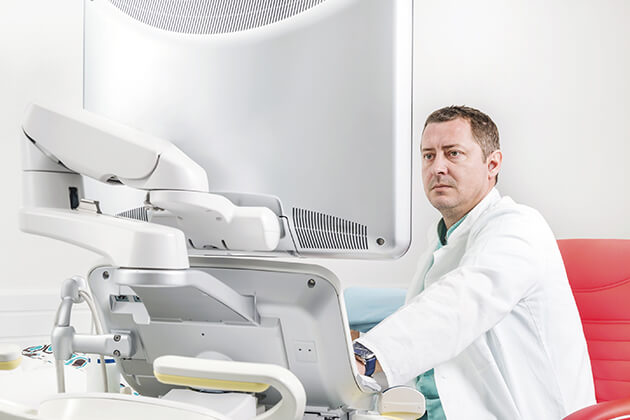

Welcome to B & J Hospital, where we offer a range of advanced diagnostic tests to assess your heart health. Our team of skilled cardiologists and technicians is dedicated to providing comprehensive evaluations using cutting-edge technologies, including Electrocardiogram (ECG), 2D Echocardiogram (2D Echo), Exercise Stress Test, and Stress Echocardiogram. Through these tests, we aim to gain valuable insights into your heart's function and identify potential issues early on. Your well-being is our priority, and we are here to guide you toward a healthier heart.

An EKG, also known as an ECG, stands for electrocardiogram, a diagnostic test that records your heart's electrical signals. It is a widely used method for assessing the proper functioning of the heart.
During an EKG procedure, you lie on an examination table while electrodes are attached to specific areas on your chest and sometimes on your arms and legs. These electrodes capture the electrical activity responsible for your heartbeats, and the data is displayed as waves on a computer monitor. This simple, painless process provides valuable information about your heart's electrical activity and overall health.

2D echocardiography, commonly called 2D Echo, is a non-invasive diagnostic test that evaluates heart function and examines specific cardiac regions. By employing sound vibrations, this procedure generates detailed images of the heart's structures, enabling the assessment of damages, blockages, and blood flow rate.
The order and combination of medical tests depend on the specific clinical scenario and the doctor's judgment. However, in specific cardiac evaluation pathways, the sequence you mentioned can be utilized:
It's important to remember that the specific sequence and combination of tests will depend on the patient's medical history, symptoms, risk factors, and the doctor's clinical judgment. Following the results of these tests, further assessments or treatments may be recommended as needed. Consult a qualified healthcare professional at B & J Hospital for personalized advice and appropriate diagnostic evaluations.
An EKG reading provides essential information about the following aspects of your heart's health:
Overall, an EKG is a valuable tool for diagnosing and monitoring various heart conditions, helping healthcare professionals assess the health and functioning of the heart.
An EKG (also known as an ECG) may be necessary if you experience symptoms related to heart issues. Some signs that might warrant an EKG include:
A standard EKG provides a snapshot of your heart's activity during the few minutes it takes to perform the test. However, a regular test may not detect the problem if your symptoms are intermittent or absent during the EKG. In such cases, your doctor may provide you with portable EKG devices like a Holter monitor or a cardiac event monitor. These devices can be worn for extended periods, allowing continuous or event-triggered heart activity recordings, helping to capture any irregularities outside the usual EKG timeframe.
If this is the case, Dr. Vinay Jaiswal & Dr. Pritish Bagul can give you portable EKG devices, such as a Holter monitor or a cardiac event monitor, which you wear for extended periods. The Holter monitor continuously records heart activity over several days, while the event monitor records heart activity when you're experiencing symptoms.
All the tests mentioned – ECG, 2D Echo, Exercise Stress Test, and Stress Echocardiogram – are non-invasive and safe. They involve no radiation exposure and generally cause minimal discomfort.
The duration of each test varies, but they are generally completed within 30 minutes to an hour, depending on the complexity of your case.
You may be asked to avoid heavy meals and caffeine before the test for Exercise Stress Test and Stress Echocardiogram. Our team will provide specific instructions tailored to your situation.
During the Stress Echocardiogram, you will undergo the 2D Echo before and immediately after the stress-inducing activity. Our team will guide you throughout the process to ensure your comfort and safety.
Our team works efficiently to analyze the test results promptly. B & J Hospital cardiologist will discuss the findings and any necessary follow-up steps during a subsequent appointment.
Doctors recommend a 2D echo to visualize the dynamic movement of the heart structures. The procedure generates cone-shaped real-time images on a monitor, allowing the physician to assess the functioning of different heart components and make evaluations accordingly.
At B & J Hospital in Navi Mumbai, we strive to provide accurate assessments and compassionate care for your heart health. Don't hesitate to schedule an appointment with our experts, Dr. Vinay Jaiswal & Dr. Pritish Bagul, today to take the first step towards a healthier heart.